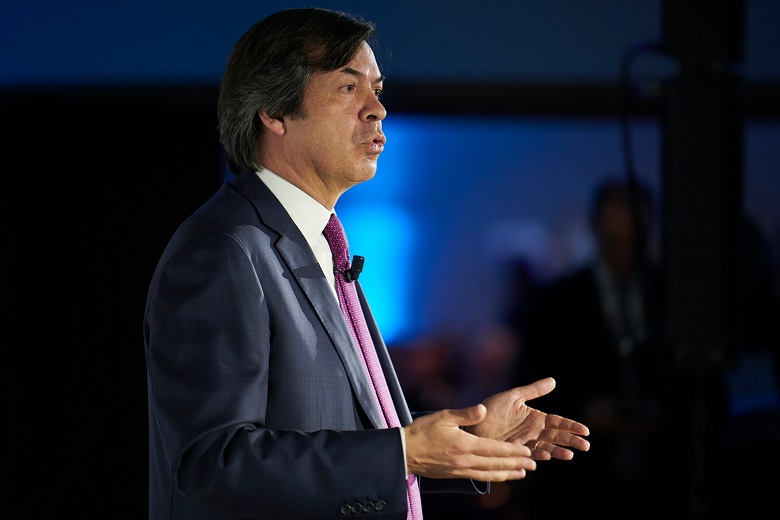Intesa Sanpaolo chief executive Carlo Messina
Will Intesa Sanpaolo’s attempt to merge with UBI Banca hasten a long-awaited wave of bank consolidation in Italy – perhaps even at the hands of UBI, if the Intesa takeover falls through?
UBI and its advisers, Credit Suisse and Goldman Sachs, are hoping that regulators and shareholders will think so, as the two banks await the outcome of a protracted inquiry by Italy’s anti-trust authority.
Intesa’s UBI merger, if it happens, would be Europe’s biggest bank takeover in a decade. It would combine Italy’s biggest bank by domestic share, Intesa, with one of the strongest lenders in the rich north of the country, UBI. But it faces a barrier in the form of opposition from UBI’s biggest shareholder pact, representing politically influential local bank foundations in Piedmont and Lombardy, and powerful entrepreneurs in Bergamo, UBI’s home town.
According to a source at Intesa, when chief executive Carlo Messina announced the deal in mid February, he anticipated opposition by UBI’s board and the shareholder pact, which represents 19% of shares. He had, however, hoped for anti-trust approval by the end of June, which now looks unlikely.
Material adverse change
This has given more time for UBI to work on alternative deals: albeit behind the scenes, as Italian takeover rules prevent more open defence actions during a public takeover bid.
Citing the coronavirus, UBI has now invoked a material adverse change (MAC) clause – something usually only an acquirer would do – as a means to get the freedom to approach other banks more formally.
But this will likely take weeks to be contested through the courts, and Intesa wants to continue as before, on the same terms.
In the meantime, Intesa may get approval from the regulators and then perhaps from the majority of UBI’s shareholders.
Intesa’s side can more convincingly argue that UBI’s real alternative is to remain a standalone institution – doing nothing to make the sector more robust
Competition barriers remain UBI’s best chance. Its side argues that Intesa’s bid could remove the bank most likely to eventually challenge Intesa’s domestic pre-eminence, by doing mergers of its own.
UBI is Italy’s third biggest bank by market capitalization, though still much smaller than either Intesa or UniCredit. Yet UniCredit is more active outside Italy than in, and its chief executive Jean Pierre Mustier has ruled out acquisitions.
Before announcing the bid, Intesa and its adviser, Mediobanca, pre-empted competition concerns by agreeing the sale of between 400 and 500 UBI branches to Modena-based BPER Banca.
Despite this, Italy’s competition authority, the AGCM, has still expressed concern about the potential disappearance of UBI, which it says could have been a consolidator and become a third big bank, making a better-balanced system.
UniCredit has also voiced such concerns.
Share values
The main benefit of Intesa’s offer to UBI shareholders is a share swap at a 27.6% premium to UBI’s price before the announcement. Intesa also intends to accelerate a non-performing loan rundown, UBI’s biggest challenge.
Sources representing UBI, however, say Intesa’s shares are overvalued, as their price is based on a dividend pay-out ratio that is increasingly hard to maintain. They point out that Intesa anticipates the same combined net income in 2022 ($6 billion) as it had previously targeted in 2021 on a standalone basis, implying the acquirer needs the UBI deal just to keep up – never mind improve – its performance.
| UBI CEO Victor Massiah |
For UBI chief executive Victor Massiah, a decision to back out of a merger with BPER just before Intesa’s move undermines any claim that UBI could be a bank aggregator. Some advisers on Intesa’s side – which include JPMorgan, Morgan Stanley, UBS and Equita SIM – go as far as to suggest powerbrokers behind UBI are prioritising their local status and even their loan conditions.
Massiah refutes that.
Intesa’s side can more convincingly argue that UBI’s real alternative is to remain a standalone institution – doing nothing to make the sector more robust – given Massiah’s previous failure to do mergers with other mid-tier banks, despite years of trying.
This makes it even more important for UBI to at least look like it would find a merger partner.
Even Intesa’s side admits that such a deal could be better for UBI’s shareholders in the long term, but much costlier in the short term. For a start, UBI’s share price is worth much more than it would be were it not for Intesa’s bid.
Other options
The other problem is UBI’s list of merger candidates is so much smaller now.
Among the other possibilities for UBI, the European Commission has given informal state-aid approval to a plan to create a bad bank for non-performing loans at nationalized Tuscan lender Banca Monte dei Paschi di Siena, perhaps making it a more attractive target.
But one of UBI’s advisers says MPS’s asset quality will be in no fit state to be a valid alternative to the Intesa deal as quickly as it is needed.
Of the other two options for a big merger, Massiah has hardly endeared himself to BPER’s main shareholders, as their influence caused him to back out of the talks before, according to an adviser on that aborted deal. In any case, BPER is committed to Intesa’s proposal.
Meanwhile, on a pre-bid basis, UBI’s market cap was only slightly bigger than Banco BPM, the third largest bank by assets, making it harder to ensure UBI, and Massiah, call the shots.


 Signal2forex.com - Best Forex robots and signals
Signal2forex.com - Best Forex robots and signals




